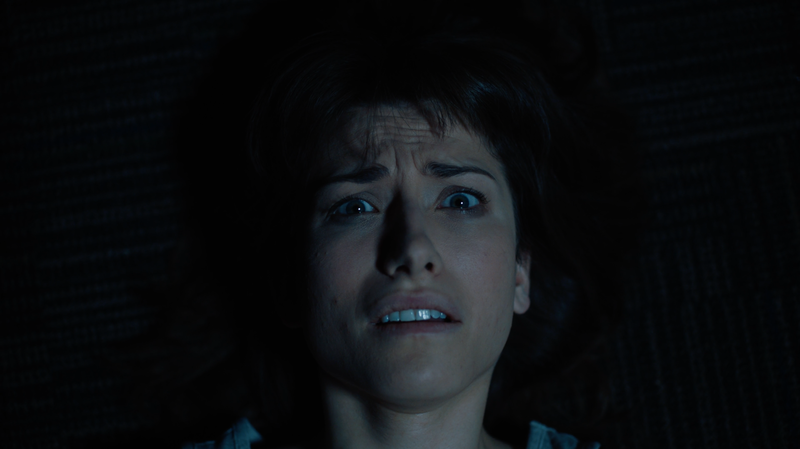
Is the True Terror Inside or Out?
The Killgrin
MOVIE REVIEW
The Killgrin
-
Genre: Horror
Year Released: 2025
Runtime: 1h 23m
Director(s): Joanna Tsanis
Writer(s): Joanna Tsanis
Cast: Konstantina Mantelos, Fuad Ahmed, Nobahar Dadui, Marie Dame
Where to Watch: Coming to theaters and VOD on April 25, 2025
RAVING REVIEW: There’s an undeniable allure to horror when it decides to target something you can’t touch or see. THE KILLGRIN explores the territory of psychological torment and emotional despair mixed with supernatural elements. Written and directed by Joanna Tsanis, this debut feature attempts to bridge human pain and otherworldly threats with a thoughtful premise, but struggles to bring its ambitious vision to life. The concept hooks you immediately—personal anguish as a breeding ground for an actual monster—but the final result lands somewhere between fascinating and incomplete.
Konstantina Mantelos anchors the film as Miranda, a young woman whose life spirals out of control after an emotionally devastating experience. Miranda’s grief isn't detailed through lengthy explanations; instead, we observe it through small, telling moments as she attempts both traditional and unorthodox recovery methods. Mantelos portrays her character with quiet realism, allowing audiences to relate to her emotional turmoil without resorting to melodrama. Her portrayal balances isolation, confusion, and desperation, providing a solid emotional core amid increasingly bizarre happenings.
Adding complexity to Miranda’s journey is Brian, played by Adam Tsekhman. Initially, Brian's overly eager approach to group therapy strikes an awkward chord, serving as comic relief tinged with discomfort. However, as the film progresses, the layers peel back, revealing Brian's underlying loneliness. This transformation enhances their connection, effectively capturing the often-complicated nature of human relationships under the weight of shared sadness.
One of the movie’s highlights is the authentic representation of therapy and emotional healing. The depiction feels genuine, presenting Miranda’s experiences—her group sessions, interactions with healers, and daily coping mechanisms—in a way that reflects the messy nature of recovery. Therapy and medication aren't quick fixes; they're portrayed as part of a difficult, ongoing process. This realistic approach lends credibility to the emotional weight of the narrative, enhancing the film’s depth by grounding the supernatural elements in recognizable struggles.
Visually, Tsanis displays strong instincts as a director, opting for a shadow-filled aesthetic that perfectly suits the mood. The film relies heavily on subtlety, favoring soft, eerie lighting and muted color palettes over flashy visuals. Alongside a cleverly designed soundscape filled with whispers and distant echoes, this visual style builds a pervasive sense of dread that feels increasingly claustrophobic. It’s a cinematic choice that works remarkably well, even as some viewers may find it slower than typical horror fare.
However, where the movie falters is in fully delivering on its supernatural promises. Initially, the film keeps the actual creature hidden, using partial glimpses and shadowy imagery to maintain suspense. This restraint serves the story well at first. Yet, when the entity finally appears clearly, it doesn’t quite live up to the previously established mood. The reliance on digital effects feels jarring, thereby diminishing the narrative's impact. This disparity between expectation and execution somewhat undermines the tension painstakingly created earlier in the film. As I often say, “you don’t always have to see the ‘scary’.”
The film’s ambiguity, though, stands as one of its greatest strengths. Instead of neatly categorizing the events as purely supernatural or strictly psychological, the narrative thrives on uncertainty. Is Miranda genuinely haunted, or is her mind playing cruel tricks? This uncertainty elevates the emotional stakes, forcing viewers to grapple with themes of grief, isolation, and inner torment on a deeper level.
The deliberate narrative pacing, intended to underscore Miranda's emotional distress, occasionally hampers the story's momentum. While the slow tempo effectively enhances the psychological tension in parts, there are stretches where the film drags. Tightening certain segments or balancing reflective moments with narrative propulsion strengthened viewer engagement without sacrificing emotional depth.
What THE KILLGRIN does well is introduce an original concept. Instead of relying on typical horror clichés, it explores how emotional pain and loss can manifest into genuine, tangible horror. The premise is refreshing, offering something more introspective than typical jump-scare tactics, and the underlying idea that grief can be a source of supernatural torment carries undeniable appeal.
Ultimately, the film feels like an ambitious debut that falls short of realizing its full potential. The thoughtful exploration of psychological trauma and the emotional authenticity in the performances are definite strengths. There's enough originality and sincere emotional insight to make it a worthwhile watch for those who appreciate horror that's more reflective than visceral.
THE KILLGRIN proves that not every horror film needs to terrify outright; sometimes, a lingering sense of emotional unease can be just as effective. Despite its shortcomings, the film leaves viewers contemplating the thin line between internal suffering and external horror, suggesting that sometimes, our greatest fears reside within.
Please visit https://linktr.ee/overlyhonestr for more reviews.
You can follow me on Letterboxd, Instagram, Twitter, and YouTube. My social media accounts can also be found on most platforms by searching for 'Overly Honest Reviews'.
I’m always happy to hear from my readers; please don't hesitate to say hello or send me any questions about movies.
[photo courtesy of DARK SKY FILMS]
DISCLAIMER:
At Overly Honest Movie Reviews, we value honesty and transparency. Occasionally, we receive complimentary items for review, including DVDs, Blu-rays, CDs, Vinyl Records, Books, and more. We assure you that these arrangements do not influence our reviews, as we are committed to providing unbiased and sincere evaluations. We aim to help you make informed entertainment choices regardless of our relationship with distributors or producers.
Amazon Affiliate Links:
Additionally, this site contains Amazon affiliate links. If you purchase through these links, we may receive a commission. This affiliate arrangement does not affect our commitment to honest reviews and helps support our site. We appreciate your trust and support in navigating these links.